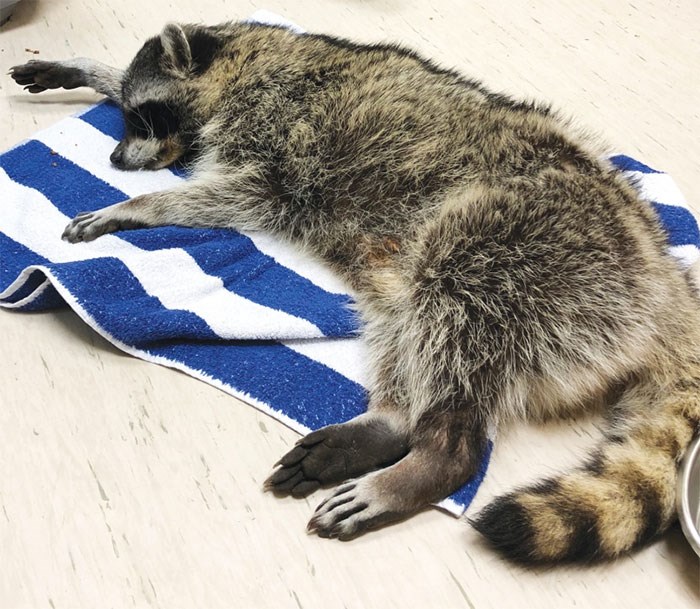 A raccoon found with marijuana and tranquilizers in its system rests after treatment at the Sechelt Animal Hospital. Photograph By SECHELT ANIMAL HOSPITAL PHOTO
A raccoon found with marijuana and tranquilizers in its system rests after treatment at the Sechelt Animal Hospital. Photograph By SECHELT ANIMAL HOSPITAL PHOTO
As animal rescuers, Clint and Irene Davy of the Gibsons Wildlife Rehabilitation Centre see animals in all sorts of predicaments, but they’d never had to help one on the verge of passing out after ingesting drugs – until last week.
Irene Davy said they had a call Jan. 10 about a raccoon lying motionless in a yard on Chaster Road in Elphinstone on the Sunshine Coast.
Stephanie Matthews made that call. She said her dog first alerted her to the raccoon when he went up to it to investigate during his morning walk. Matthews said the raccoon looked like it was injured and was curled into a ball, and when it did try to walk it could only manage to shuffle.
Clint Davy also thought the animal had suffered a serious injury.
According to Irene, the raccoon appeared “dazed, very lethargic, couldn’t stand, couldn’t walk. We were very concerned that he had some spinal injury or broken pelvis.”
Clint was able to get the animal into a cage and rush it to the Sechelt Animal Hospital, and that’s when they got the surprise diagnosis. The vet discovered the unresponsive animal wasn’t physically hurt – it was feeling the effects of drugs.
A screen turned up traces of marijuana in the raccoon’s system. The critter also tested positive for benzodiazepines, a class of tranquilizer that includes Valium and is often used in treating anxiety disorders as well as insomnia.
Fortunately, the vet’s recommended treatment – putting the raccoon in a quiet, dark place to sleep it off – worked and it was released back into the wild later the same day.
“He recovered quite quickly. By six o’clock he was acting like a normal raccoon, hissing and wanting out of the kennel we had him in,” Irene Davy said.
While the image of a stoned raccoon might provoke a laugh, Davy said they’re telling the story to make the public aware of a potential danger to wildlife.
She said they have no idea how the animal ended up ingesting the drugs, but they suspect it may have eaten discarded butt ends from someone’s joints or gotten into a home or shed where someone was keeping cannabis bud or edibles that might have attracted the hungry scavenger.
“Luckily for this raccoon, he was found in a safe place and we were able to get him,” Davy said. “But he could have wandered into the road and collapsed, or had predators attack him [while incapacitated].”
Davy said they want to get the message out that if you use marijuana or other drugs, take care to dispose properly of anything that might end up getting eaten by pets and wildlife.
The BC SPCA and veterinarians in the province have warned several times over the past couple of years about an increase in the number of pets accidentally consuming marijuana.
Dr. Emilia Gordon, BC SPCA’s senior manager of animal health, said the effects of the THC component of cannabis can include gastrointestinal upset, lethargy, loss of coordination, and incontinence. At higher doses, such as those in some edibles, it can lead to serious neurological symptoms, coma and even death.


